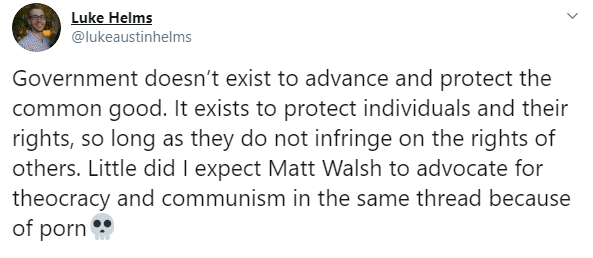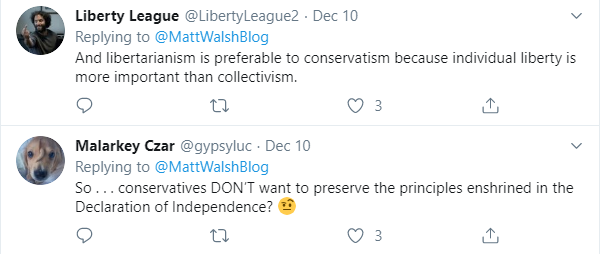Using Marx's theory of alienation has its advantages and disadvantages. The advantage is that Dworkin doesn't follow the usual script of explaining discontent along the lines of "it's people who are uneducated" or "it's people who don't want to give up power". Instead, he sets out clearly why people are increasingly alienated in modern society; at times he sees the same things that traditionalists see.
The disadvantage of using a Marxist theory of alienation is that Dworkin brings everything back to the economic system. He is not anti-capitalist, but he sees the way that advanced capitalism works as being at the root of the problem. As capitalism isn't going away anytime soon, he thinks that there is no way of bringing back the older, more functional forms of society. He proposes instead some economic policy reforms to ameliorate the situation we find ourselves in.
Dworkin is right that capitalism presents challenges to the survival of traditional institutions. But mixed in with the influence of the economic system are ideological beliefs which also push society in a particular direction. And if you control the institutions within a community which enculturate young people, you also have some power to influence the shape of that community.
A good example of this is Dworkin's analysis of our growing alienation from the opposite sex. Dworkin correctly notes that the economic system wants us as fungible units of production and consumption and that sex distinctions have no utility within this system:
Advanced capitalism takes alienation a step further. It has stripped men and women of their “otherness.” Men and women once had a sense of mystery about them—a gender specific nature—causing each to remain slightly inaccessible to the other, while at the same time stoking admiration in the other’s eyes. This disappeared when advanced capitalism pushed gender-neutrality to wring more profit from exchangeable bodies working in space. With male and female nature denied, men and women became consumers with needs; gender itself became a consumption good. The new state of affairs heightens MGTOW suspicions about women, as the charm of “otherness,” rooted in nature and designed to foster sympathy and understanding between the two sexes, is eclipsed by a paranoid fear that women scheme to meet their needs...
It gets worse. The lack of “otherness” detracts from sexual excitement, as people lose their allure in each other’s eyes. As a woman’s mind and nature cease to be any different from a man’s, only her body stimulates some men...In all this, the number of men living alone has more than doubled since the 1970s...
If the loss of sex distinctions is due solely to an advanced capitalist economy, and that economy is here to stay, then androgyny is inescapable:
At the same time, advanced capitalism cannot be reversed. Gender neutrality is inevitable. The alienation between men and women will persist, even as it continues to be glossed over...today’s political center cannot be what it was in Tocqueville’s America, with the latter’s strong two-parent families, small businesses, robust local communities, and widespread religious belief. That center belongs to another age.
Dworkin reasons that children give a purpose to life, so there should be economic policy reforms to help people have children. For instance, women might get money to raise children as single mothers:
Social Security might be adjusted over the coming decades, such that, instead of people getting large monthly sums starting in their late 60s, they would get smaller monthly sums starting in their 20s. This would make raising children, often by single parents, more feasible.
One problem with Dworkin's analysis is that the aim of making sex distinctions not matter goes back some way, certainly before the arrival of advanced capitalism. And it was initially justified as part of the "liberty and equality" levelling mindset that took hold amongst the leftist intelligentsia by the later 1700s. The proto-feminist Mary Wollstonecraft wrote at this time:
A wild wish has just flown from my heart to my head, and I will not stifle it…I do earnestly wish to see the distinction of sex confounded in society
There was a contest in Western culture about what constituted freedom. Those who saw human nature as corrupted and imperfectible tended to view freedom as a matter of restraining our own vices, i.e. as a contest between the noble and the base within human nature reflecting on individual character; those who thought human nature could be acted on and perfected tended to think in terms of a social progress toward an ultimate state of human community, one in which there was no need for restraining social norms, or institutions, or hierarchies, but only the sovereign individual motivated by an abstract, universal love.
The latter group did not like sex distinctions, seeing them as limiting to the individual. An example is the English poet Percy Bysshe Shelley, writing in the early 1800s. In his attitude to marriage, you see the shift from the idea of individuals needing to exercise restraint in order to access the higher aspects of their nature, to the idea of restraint being a merely arbitrary and regressive block to choice and change:
That which will result from the abolition of marriage will be natural and right; because choice and change will be exempted from restraint.
Predictably for someone with this mindset, Shelley looked forward to the abolition of sex distinctions:
...these detestable distinctions will surely be abolished in a future state of being
You have a combination, then, of a change in mindset in which sex distinctions are thought to be regressive and a limitation on freedom with an economic system in which individuals are prized as interchangeable units of production and consumption, with sex distinctions having no positive function within the system (except for the need to create a future labour force - but in an era of mass migration this has been outsourced).
Can we change mindsets? Yes, we can, but we're unlikely to be funded to do so by those possessing large amounts of capital. That's the conundrum. One possibility is to start small and create institutions that can enculturate young people within a more traditional mindset (e.g. via churches, schools, political organisations, fraternities, independent media sites). Another possibility is a frontal assault on the failed ideology of individual autonomy, not just by one isolated writer, but as a movement of Western intellectuals.
I mentioned earlier that a strength of Dworkin's approach is that it pushes him to take more seriously than most other mainstream writers the sources of people's alienation in modern life. I can't quote as much as I'd like to (it's worth reading the whole article), but as an example he clearly recognises the difficulty of family formation for women who accept the usual modern life path:
...the sexual revolution and capitalism’s promise of meaningful work have tempted some women with a plan for life that requires perfect timing and cooperation to be executed: A woman, too, will satisfy her sexual urge during her twenties and egotistically pursue her career, just like men. Then, when the maternal instinct kicks in, she will find the right man whose ego will not be threatened by all the men she has slept with, who will marry her and give her children, while also supporting her in her career. The plan is untenable...Today, 45 percent of Americans are single, the highest percentage in history.
The phrase "that requires perfect timing and cooperation" is well observed. Women are encouraged to sleep around in their teens and their 20s and then, having undermined the family guy ethos among the men of their age cohort, find a man willing to commit to them and have children in the relatively short space of time left to them. It's extraordinarily ill-conceived.
Here, too, Dworkin is too much of an inevitabilist. It is not just advanced capitalism that pushes young women to be imprudent. It is also the mindset I wrote about earlier, the one that claims that we should be able to choose in any direction without restraint or limitation, even from the logical consequences of our choices. Young women are generally told that if the life script isn't working it's not so much because it is ill-conceived but because men or the patriarchy or sexism or toxic masculinity are somehow subverting it. That there is nothing in nature to limit what we might choose to do and if there is it can be acted on through the use of some technology (e.g. freezing eggs). Some women report simply not being brought up to focus at all on the issue of family formation, the assumption being that it will happen of itself.
In other words, if the messaging were different, so too might be the results. If political concepts were different, so too might be the results. If the understanding of life and what brings meaning were different, so too might be the results. Yes, you would still have people with power preferring to encourage ideas about a lifestyle based on career and consumption, but within a community that cared about family formation there could at least be counter-messaging.
A note to Melbourne readers. If you are sympathetic to the ideas of this website, please visit the site of the Melbourne Traditionalists. It's important that traditionalists don't remain isolated from each other; our group provides a great opportunity for traditionalists to meet up and connect. Details at the website.









